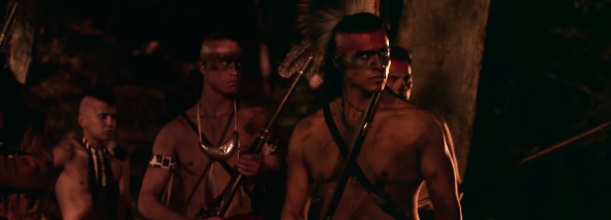Alone Yet Not Alone is racist, bigoted, proselytising trash

When this year’s Academy Award nominations were announced a couple of weeks ago, many reporters (not us; we were too busy talking about Nic Cage) picked up on one of the more obscure, unexpected films to make the grade – Alone Yet Not Alone, an “independent, faith-based movie” about conflicts between colonists and Native Americans in 1750s Ohio. The film’s theme song was nominated for Best Original Song, competing alongside the decidedly more heavyweight Frozen, Her, Despicable Me 2 and Mandela: Long Walk to Freedom. Here it is:
Ghastly, isn’t it? Keening, trite, sentimental garbage, topped off with that revolting prayer at the beginning. It’s obviously not Oscar-worthy, which is just as well since it isn’t nominated any more. In an incredibly unusual move, the Academy has struck Alone Yet Not Alone from consideration after it became clear that the song’s co-writer Bruce Broughton, an executive committee member and former governor of AMPAS’ music branch, appealed to other voters in respect of his submission. Broughton claims that his “grass roots” promotion was much less influential than the huge promotional campaigns that support bigger-budget movies during awards season, but his second ever Oscar nomination (his score for Silverado lost out to Out of Africa in 1985) has nevertheless been rescinded.
Good. We’re entirely in agreement with the Academy on this; Broughton was dealing under the table and doesn’t deserve to be considered. But I can’t help feeling that a little unethical promotion and a bloody awful song aren’t really the worst things about Alone Yet Not Alone, which (on the basis of its trailer, IMDb synopsis and so on) appears to be just startlingly racist. Here’s an edited excerpt from that IMDb introduction:
“The year is 1755, and the English colonies are being ravaged by the atrocities of war. Opposing European powers have clashed over the fertile Ohio valley, and entire families are devastated by the ensuing violence. Hostile native tribes are raiding the vulnerable frontier farms, and two young sisters are among those taken captive… When the sisters are suddenly and cruelly separated, their tender faith is brought to a stretching point. Forcibly immersed into a primitive foreign culture, the older sister, Barbara, clings to her beliefs. Yet now a deeper fate threatens, and she makes a difficult decision: to risk her life in an attempt to escape. Pursued by a relentless and cunning warrior, Barbara must continue to fanny around and fling biased adjectives at her cruel, savage, grubby Indian captors, because JESUS LOVES WHITES AND THAT’S ALL THERE IS TO IT.”
I may have tweaked the ending to that, but otherwise it’s completely legit. Exhibit 2 is the trailer:
Ignoring for a moment the ghastly acting and writing (although the production values are quite high, because evangelicals have hell of cash), let’s look at a few quotes and stills.
VOICEOVER: In a land of new-found plenty…
GERMAN MAN: Ja, we are blessed here. Two hundred bushels of corn from our own land!
Right, initial points: it’s not new-found, it’s just new-found by obnoxious Calvinist (I just BET they’re Calvinist) settlers. And it’s not your own land, it’s Native American land (or, as they preferred to think of it before we spent three hundred years destroying their civilisation, nobody’s land at all). Shove your manifest destiny up your arse, Fritz.
GERMAN MAN: If we were still in Germany, John and Christian would be forced into the Duke’s army for seven years, fighting wars that never seem to end, as I did as his age.
Guess what didn’t exist in 1755? Or in 1785, 1800, 1830, 1850 or indeed at any point until 1871? Yep. Germany. Already this is arrant nonsense – BUT, because Best For Film is substantially cleverer than the morons who produced this film, we can do some digging to find out what they really mean. The man speaking has the surname Leininger, which is also the name of the ghastly woman who wrote the book on which this film is based (she claims, bafflingly, that Barbara was her grandmother despite the fact that Barbara would now be at least 269 years old), and we know Leininger to be a name of Bavarian origin. The Duke of Bavaria in 1755 was Maximilian III Joseph, one of the most progressive and enlightened rulers in the history of the Holy Roman Empire; he encouraged industry, banned Jesuit censorship of the press, sold his crown jewels during times of famine and, crucially, did his utmost to keep Bavaria out of the wars. Herr Leininger is simply not telling the truth. Still, Herr Leininger, it could be worse – you and your “family of unshakeable faith” could be in Middle Earth. What say you, trailer?

OH GOOD, IT’S LITERALLY AN ORC. I’m not, unfortunately, able to name the actor shown in this shot, because with precisely three exceptions the Native American characters are called things like “Mean Native”, “Tall Native” and “Kind Native Woman”. As far as I can tell, the named “Indians” earnt their names by virtue of having several scenes with white people, whereas a load of savages in a wood don’t really need names, or characters. Nor is it necessary to make even a vague stab at casting actors of Native American descent. Of the three named roles mentioned, the most significant (faintly rapey savage love interest, obv) was played by a Hispanic American. One of the others was played by a historical re-enactor who doesn’t appear to have any background as an actor at all, but probably came with his own headdress, and the third was apparently so dismally portrayed that the actor responsible has recently apologised for his performance on Twitter.
I am sorry. I did not mean to offend anyone. My character was a frontline soldier in a wartime situation. He was enraged, not savage.
— Tony Wade (@8BitExtremist) January 16, 2014
But I digress – back to the trailer. In the thirty seconds following the shot of the Iroquois Uruk-Hai above, these are the things that happen:
– a wolf drools
– a Native American lit by a torch raises his knife, then sniffs at the air
– armed Native Americans walk menacingly up a hill
– and smash up someone’s house
– and kill a guy
– Sitting around a fire, another menacing Native American (possibly the guy whose tweet is reproduced above) clenches a fist and goes on about reclaiming the hunting grounds
– two topless, gleaming Native Americans rise out of the long grass and stare at a nearby colonist’s house
– a Native American catches a fish and eats it raw
– three different people say ‘savage’ in five seconds of voiceover, whilst a Native American shoots a white man and another one raises his hand to a woman tied to a tree
– A gruff Native American literally says “Now, you become Indian children.” This, whilst shocking to modern ears (yes, I’m aware that some Native Americans self-identify as Indians or American Indians), is actually not inaccurate – it’s just the fault of the bloody Germans, who still blithely use the term Indianer Nordamerikas.
It’s quite hard to remember that this is a film about shamelessly glorifying Christianity rather than relentlessly defaming America’s native peoples, isn’t it? Do try to stick with it – probably nothing else that deliberately casts the “savages” as, well, savage will happen.

Super. The rest of the trailer continues in a similar vein, with nice barbarian drums thudding in the background as lots of shots of virginal blondes looking pious are intercut with the Red Man brandishing weapons, leaping over fallen trees, gurning at noble settlers and generally behaving like animals, which is clearly what the film-makers believe them to be. Then Barbara, looking improbably polished for someone in the middle of a 300-mile trek back to the safety of her Bible and her bigotry, says a little prayer, because – no matter how many savages with sticks assail them, “God will never leave us.” Aww. The voiceover man has a little rumble about how she has “an oath to keep; a faith to uphold; a destiny to fulfil”, for which I think Dave Lamb should track him down and tear out his larynx (alas, I’m not 100% sure that voiceover artists have that sort of internal code of honour). And we’re into the set-up for the title. Ready for it?
ABDUCTED yet not ABANDONED, IMPRISONED yet not ENSLAVED, ALONE yet not… hang on, go back. Enslaved? Is this a word you’re really comfortable using about your pretty, white, clearly-going-to-be-fine protagonist, Christians? In the wake of your religion being used to justify slavery in the Americas on the basis that it was better to be a slave to a Christian family than live as a free heathen, or that Africans were the sons of Ham, who looked upon his father Noah when he was drunk and naked and was thereby cursed? In the same month that 12 Years a Slave came out? Enslaved? Blimey, you’re braver than I thought. Or maybe – just a thought – you’re spectacularly ignorant and prejudiced and dreadful? Might be that one. Anyway, the film is called Alone Yet Not Alone, because even when there are no white people near you God is always there. As are the Native Americans who you’re living with and who want you to marry into the tribe and have apparently supplied you with salon-quality hair products, of course, but they don’t count.

If a film that so specifically and relentlessly glorified, say, Islam (particularly at the expense of another culture) was released in America, cinemas would be burnt down. And if Alone Yet Not Alone ever makes it to a full theatrical run, which looks pleasingly unlikely, we’re not convinced that burning down cinemas on purely artistic grounds would be unjustified. We’re all for religious freedom at Best For Film, unless you’re a Mormon which is clearly nonsense, but there’s a perfectly clear line between ‘storytelling’ and ‘propaganda’, just like there’s a gaping bloody gulf between ‘portraying another culture’ and ‘being incredibly racist’. Alone Yet Not Alone shows absolutely no interest in observing either line in the sand, so obsessed is it with forcing a historically inaccurate, morally defunct and unashamedly bigoted story, which glorifies the white Christian settlers and demonises the savage Godless natives, on its intended demographic of other evangelical morons and their helpless children.
I’d like to wrap up with a quote from Kefira Phillipe, an Illinois schoolteacher, on the Amazon page of the book that inspired this film:
“What could have been an interesting story of survival is diminished by the book’s simplistic tone and lack of nuance. The settlers are beautiful and compassionate, while many Indians are unattractive, cruel, and troubled because they don’t believe in one god. The depiction of them is beyond biased and there is no attempt to provide any historical background or explanation for their actions. It will be difficult to find an audience for this book.”
Sounds charming, doesn’t it? We haven’t had the opportunity to see Alone Yet Not Alone – to judge by its empty RottenTomatoes rating, neither has any other critic – but as and when we do, you can be sure we’ll be back with an even more in-depth assessment of this suppurating trench of moral and cultural turpitude. The Academy was right to disqualify Alone Yet Not Alone, but it’s irresistibly apparent that they did it for the wrong reasons.





“Iroquois Uruk-Hai”… Heh. Well played, article.
(That said… Calling Mormonism ‘nonsense’? Dude, I’m a Catholic. We believe that bread can literally be turned into torso with words. Ancient Jews building boats and sailing to America at least conforms to the laws of physics.)
Come now, we’re not suggesting that Catholicism’s any less nonsensical! It’s all ridiculous, but as far as we know there aren’t that many preachy Catholic indie films. Unless Mel Gibson’s around.